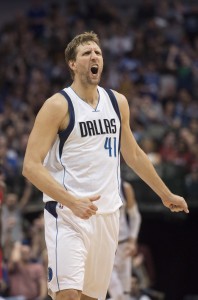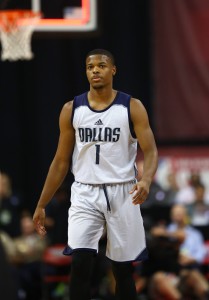Hoops Rumors is breaking down the 2017 offseason for all 30 NBA teams, revisiting the summer’s free agent signings, trades, draft picks, departures, and more. We’ll evaluate each team’s moves from the last several months and look ahead to what the 2017/18 season holds for all 30 franchises. Today, we’re focusing on the Dallas Mavericks.
Signings:
- Dirk Nowitzki: Two years, $10MM. Second-year team option.
- Nerlens Noel: One year, $4.188MM. Signed qualifying offer.
- Jeff Withey: Two years, minimum salary. First year partially guaranteed ($350K).
- Maxi Kleber: Two years, minimum salary. First year fully guaranteed.
- Johnathan Motley: Two-way contract. Two years, $50K guaranteed in each season.
Camp invitees:
- Brandon Ashley: One year, minimum salary. Exhibits nine and 10.
- Gian Clavell: One year, minimum salary. Exhibits nine and 10.
- P.J. Dozier: One year, minimum salary. Exhibits nine and 10.
- Maalik Wayns: One year, minimum salary. Exhibits nine and 10.
Trades:
- Acquired cash ($175K) from the Rockets for DeAndre Liggins.
- Acquired cash from the Rockets for Jarrod Uthoff.
- Acquired Josh McRoberts, cash ($5.1MM), and a 2023 second-round pick from the Heat in exchange for A.J. Hammons.
Draft picks:
- 1-9: Dennis Smith Jr. — Signed to rookie contract.
Departing players:
- Nicolas Brussino (waived)
- A.J. Hammons
- DeAndre Liggins
- Jarrod Uthoff
Salary cap situation:
- Operating as an over-the-cap team with full mid-level ($8.406MM) and bi-annual ($3.29MM) exceptions available.
- Can create up to approximately $18MM in cap room by renouncing exceptions and waiving non-guaranteed contracts.
Check out the Dallas Mavericks’ roster and depth chart at RosterResource.com.
Story of the summer:
The Mavericks finished with a losing record last season for the first time since the 1999/2000 campaign, and the team’s 33-49 mark, good for 11th place in the Western Conference, appeared to serve as a wake-up call.
Having been a perennial player for big-money free agents in recent years, the Mavericks sat out the summer fun in 2017, rightly recognizing that they weren’t just a player or two from title contention. When the Mavs won the championship in 2011, they were one of several teams that had a viable shot at a title, but the dominance of the present-day Warriors likely helped Mark Cuban and company realize that it would require more than just a little good fortune in the postseason to return to the NBA Finals.
Rebuilding certainly wasn’t the Mavs’ preference — the club had prioritized win-now moves over the last several years in the hopes of getting Dirk Nowitzki a shot at one last title. But even with the clock running out on Nowitzki’s playing career, the time was right for a rebuild in Dallas, as the team entered the offseason with a top-10 draft pick in hand for the first time in nearly two decades. With many of their conference rivals loading up to make a run at Golden State, the Mavs made a $5MM guarantee for Nowitzki their biggest free agent expenditure of the summer.
